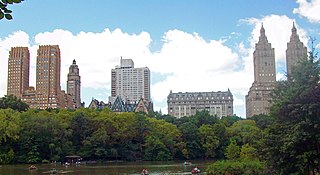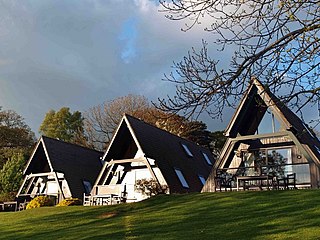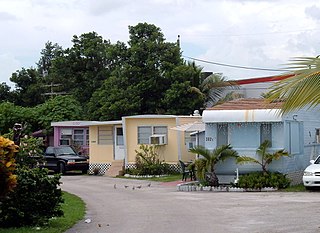In English law, a fee simple or fee simple absolute is an estate in land, a form of freehold ownership. A "fee" is a vested, inheritable, present possessory interest in land. A "fee simple" is real property held without limit of time under common law, whereas the highest possible form of ownership is a "fee simple absolute," which is without limitations on the land's use.

An apartment, or flat, is a self-contained housing unit that occupies part of a building, generally on a single story. There are many names for these overall buildings, see below. The housing tenure of apartments also varies considerably, from large-scale public housing, to owner occupancy within what is legally a condominium, to tenants renting from a private landlord.
This aims to be a complete list of the articles on real estate.
A homeowner association, or a homeowner community, is a private association-like entity often formed either ipso jure in a building with multiple owner-occupancies, or by a real estate developer for the purpose of marketing, managing, and selling homes and lots in a residential subdivision. In the United States, the developer will typically transfer control of the association to the homeowners after selling a predetermined number of lots.
A property tax or millage rate is an ad valorem tax on the value of a property.
Owner-occupancy or home-ownership is a form of housing tenure in which a person, called the owner-occupier, owner-occupant, or home owner, owns the home in which they live. The home can be a house, such as a single-family house, an apartment, condominium, or a housing cooperative. In addition to providing housing, owner-occupancy also functions as a real estate investment.
Housing tenure is a financial arrangement and ownership structure under which someone has the right to live in a house or apartment. The most frequent forms are tenancy, in which rent is paid by the occupant to a landlord, and owner-occupancy, where the occupant owns their own home. Mixed forms of tenure are also possible.
A condominium is an ownership structure whereby a building is divided into several units that are each separately owned, surrounded by common areas that are jointly owned. The term can be applied to the building or complex itself, as well as each individual unit within. The term "condominium" is mostly used in the USA and Canada, but similar arrangements are used in many other countries.

A landlord is the owner of a house, apartment, condominium, land, or real estate which is rented or leased to an individual or business, who is called a tenant. When a juristic person is in this position, the term landlord is used. Other terms include lessor and owner. The term landlady may be used for the female owners. The manager of a pub in the United Kingdom, strictly speaking a licensed victualler, is referred to as the landlord/landlady. In political economy it refers to the owner of natural resources alone from which an economic rent is the income received.

A housing cooperative, or housing co-op, is a legal entity, usually a cooperative or a corporation, which owns real estate, consisting of one or more residential buildings; it is one type of housing tenure. Housing cooperatives are a distinctive form of home ownership that have many characteristics that differ from other residential arrangements such as single family home ownership, condominiums and renting.

A timeshare is a property with a divided form of ownership or use rights. These properties are typically resort condominium units, in which multiple parties hold rights to use the property, and each owner of the same accommodation is allotted their period of time. Units may be sold as a partial ownership, lease, or "right to use", in which case the latter holds no claim to ownership of the property. The ownership of timeshare programs is varied, and has been changing over the decades.
Strata title is a form of ownership and housing tenure devised for multi-level apartment blocks and horizontal subdivisions with shared areas. The word "strata" refers to apartments being on different levels.
Property management is the operation, control, maintenance, and oversight of real estate and physical property. This can include residential, commercial, and land real estate. Management indicates the need for real estate to be cared for and monitored, with accountability for and attention to its useful life and condition. This is much akin to the role of management in any business.
A vacation rental is the renting out of a furnished apartment, house, or professionally managed resort-condominium complex on a temporary basis to tourists as an alternative to a hotel. The term vacation rental is mainly used in the US. Other terms used are self-catering rentals, holiday homes, holiday lets, cottage holidays and gites.
Fractional ownership is a method in which several unrelated parties can share in, and mitigate the risk of, ownership of a high-value tangible asset, usually a jet, yacht or piece of resort real estate. It can be done for strictly monetary reasons, but typically there is some amount of personal access involved. One of the main motivators for a fractional purchase is the ability to share the costs of maintaining an asset that will not be used full-time by one owner.

A condo hotel, also known as a condotel, hotel condo or a contel, is a building which is legally a condominium but which is operated as a hotel, offering short term rentals, and which maintains a front desk.

Utility sub-metering is a system that allows a landlord, property management firm, condominium association, homeowners association, or other multi-tenant property to bill tenants for individual measured utility usage. The approach makes use of individual water meters, gas meters, or electricity meters.
A common area is, in real estate or real property law, the "area which is available for use by more than one person..." The common areas are those that are available for common use by all tenants, (or) groups of tenants and their invitees. In Texas and other parts of the United States, it is "An area inside a housing development owned by all residents or by an overall management structure which charges each tenant for maintenance and upkeep."
Real estate is property consisting of land and the buildings on it, along with its natural resources such as crops, minerals or water; immovable property of this nature; an interest vested in this (also) an item of real property, buildings or housing in general. In terms of law, real is in relation to land property and is different from personal property while estate means the "interest" a person has in that land property.

One in eight Canadian households lived in a residential condominium dwellings, mostly located in a few census metropolitan areas according to Statistics Canada Condominiums exist throughout Canada, although condominiums are most frequently found in the larger cities. "Condominium" is a legal term used in most provinces of Canada. in British Columbia, it is referred to as "strata title" and in Quebec, the term "divided co-property" is used, although the colloquial name remains "condominium".






